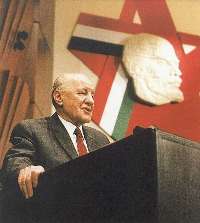Vandals dig up grave of Hungary's communist-era leader Janos Kadar
Vandals dug up the grave of Hungary's communist-era leader Janos Kadar, damaged his casket and stole the urn containing his wife's remains.

"Not all the grave site was dug up," Budapest Police spokesman Endre Kormos said at the scene, adding that forensic experts were investigating whether any of Kadar's remains had been taken from the coffin.
The tomb's marble cover was removed, and some dirt beneath was dug up, police said.
The vandals also wrote "Murderer and traitor, you cannot rest in holy ground" on a memorial to communist leaders near Kadar's tomb.
Prime Minister Ferenc Gyurcsany a former communist youth leader who has distanced himself recently from Kadar's regime condemned the attack as an "abominable, inhumane and cowardly act" that had nothing to do with politics or with Kadar's political legacy.
Fidesz, the main center-right opposition group, and other political parties across the ideological spectrum also condemned the vandalism.
Kadar, who became Hungary's leader after the defeat of the 1956 anti-Soviet revolution, was in power until 1988 and died in 1989, a few months before the democratic changes.
He and his wife, Maria Tamaska, are buried together at the Kerepesi Cemetery near the city center.
A special 10-member police unit was set up to investigate the crime.
The vandals had dug about 1.5 meters (5 feet) into the ground, said Edit Simoka, director of the Budapest Funeral Institute, which oversees the cemetery.
Security guards who discovered the vandalism initially thought maintenance work was being done on the tomb, as hundreds of people had visited and left candles at the site on May 1, the Labor Day holiday.
Some Hungarians, especially among the elderly, consider Kadar a father figure who provided them with a better life in comparison to other communist countries.
There are about 3,000 famous Hungarians buried in the 140-acre (56-hectare) cemetery, Simoka said.
Subscribe to Pravda.Ru Telegram channel, Facebook, RSS!




